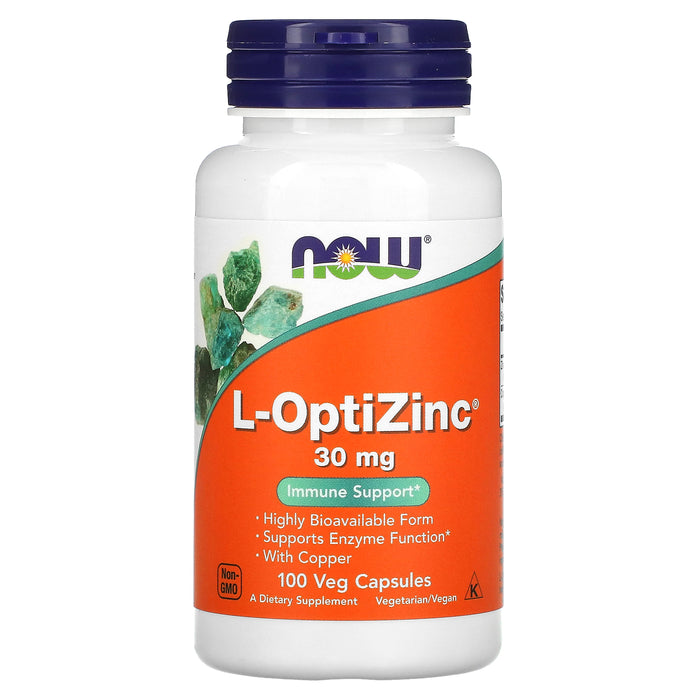




| Serving Size: 1 Veg Capsule | ||
| Servings Per Container: 100 | ||
| Amount Per Serving | % Daily Value | |
| Zinc (from 170 mg L-OptiZinc® Monomethionine) |
30 mg | 273% |
| Copper (from 3 mg Copper Amino Acid Chelate) | 0.3 mg | 33% |
Enhance immune support and skin health with NOW Foods L-OptiZinc, a bioavailable form of zinc.
NOW Foods L-OptiZinc is a non-GMO, vegetarian/vegan, and kosher dietary supplement that supports immune health with a highly bioavailable form of zinc. This formula features zinc complexed with methionine, which research has shown to be better absorbed and retained compared to other forms of zinc, along with copper for added support.
Take 1 capsule daily.
Rice flour, hypromellose (cellulose capsule) and stearic acid (vegetable source).
Not manufactured with wheat, gluten, soy, milk, egg, fish, shellfish or tree nut ingredients. Produced in a GMP facility that processes other ingredients containing these allergens.
For adults only. Consult physician if pregnant/nursing, taking medication, or have a medical condition. Keep out of reach of children.
Natural color variation may occur in this product.
Store in a cool, dry place after opening.
At Health Orchard, we are committed to providing accurate product information and images. However, manufacturers may update their product packaging or ingredients, and these changes may not be immediately reflected on our website. It's possible for products to be shipped with different packaging than what is shown online. For the most accurate and safe use of any product, we advise reading the product's label, warnings, and instructions rather than relying solely on the details provided by Health Orchard.
NOW Foods, L-OptiZinc is primarily used to support immune function and promote overall health. It plays a crucial role in various bodily processes, including protein synthesis, wound healing, DNA synthesis, and cell division, making it beneficial for maintaining general well-being and supporting optimal body function.
NOW Foods, L-OptiZinc is typically taken with food to enhance absorption and minimize potential gastrointestinal discomfort. It's often recommended to take it at the same time each day to maintain consistent levels in the body, but the specific timing can vary based on individual needs and preferences.
OptiZinc, a patented form of zinc monomethionine, is often considered more bioavailable than other forms of zinc. This increased absorption and retention in the body can potentially lead to better overall effectiveness compared to standard zinc supplements, though individual responses may vary.
Common side effects of NOW Foods, L-OptiZinc may include nausea, vomiting, loss of appetite, abdominal cramps, diarrhea, and headaches. In some cases, high doses of zinc can interfere with the absorption of other minerals like copper and iron, potentially leading to deficiencies if used long-term without proper balance.
Daily use of NOW Foods, L-OptiZinc is generally considered safe when taken at recommended doses. However, long-term use of high doses may lead to adverse effects or mineral imbalances, so it's important to follow the suggested dosage on the product label or as advised for your specific needs.
NOW Foods, L-OptiZinc is not typically associated with negative effects on liver or kidney function when taken as directed. However, excessive zinc intake over extended periods could potentially strain these organs, as they play a role in processing and eliminating excess minerals from the body.